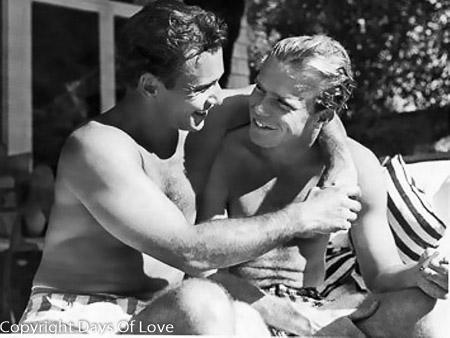 Arthur
Laurents (July 14, 1917 – May 5, 2011) was an American playwright, stage
director and screenwriter.[3]
Arthur
Laurents (July 14, 1917 – May 5, 2011) was an American playwright, stage
director and screenwriter.[3]Partner Farley Granger, Tom Hatcher
Queer Places:
Erasmus Hall High School, 911 Flatbush Ave, Brooklyn, NY 11226, Stati Uniti
Cornell University (Ivy League), 410 Thurston Ave, Ithaca, NY 14850
New York University, New York, 10003, Stati Uniti
9 St Lukes Pl, New York, NY 10014, Stati Uniti
220 Dune Rd, East Quogue, NY 11942, Stati Uniti
 Arthur
Laurents (July 14, 1917 – May 5, 2011) was an American playwright, stage
director and screenwriter.[3]
Arthur
Laurents (July 14, 1917 – May 5, 2011) was an American playwright, stage
director and screenwriter.[3]
Arthur Laurents moved to Hollywood expecting to be guided along by the industry's established gay community. As a Broadway playwright, he had known a network of gay friends and acquaintances in New York. Moving to Hollywod in 1947, he said, he looked for a similar "gay friend" to show him the way: "I knew nothing about the attitudes toward homosexuality in the city of Los Physically Desirable."
Although the handsome writer was quickly welcomed into Hollywood's gay circles, making the acquaintanceships of Leonard Spigelgass, George Cukor, and David Lewis, Laurents was disappointed by their deep commitment to circumspection. "The first time I met Lennie Spiegelgass," he remembered, "he chased me around the room. It misled me. I thought it meant he was going to be more open than he was." Laurents found Spigelgass "very conservative," very guarded about his image and place in the Hollywood structure.
Within a short time of his arrival in the film colony, Laurents had become lovers with the actor Farley Granger, and they moved in together. "People still say to me, "Oh, you were so brave, living openly with your lover," he recalled. "But I really didn't think of it that way. It wasn't intended as a political statement. I just felt I had to live my life the way that was right for me. There's no way I could have lived that pretense the way these other guys did."

West Side Story creative team From left to right: Stephen Sondheim (lyrics), Arthur Laurents (book), Hal Prince (producer), Robert E. Griffith (producer), Leonard Bernstein (music), and Jerome Robbins (director).
Elmer Holmes Bobst Library, 70 Washington Square S, New York, NY 10012
9 St Lukes Pl
Laurents' early film scripts include Rope (1948) for Alfred Hitchcock, followed by Anastasia (1956), Bonjour Tristesse (1958), The Way We Were (1973), and The Turning Point (1977).
Hatcher was an aspiring actor whom Gore Vidal suggested Laurents seek out at the Beverly Hills men's clothing store Hatcher was managing at the time. Harcher was cast as "The Boy" in A Clearing in the Woods (1957), and at the time their relationship was already ongoing. Hatcher also played the role of Schuyler Grogan in Laurents' Invitation to a March (1960) before retiring from acting to became a contractor. In 1995 Laurents said: "He is more to me than he ever was, and I'm happier that I ever was." The couple remained together for 52 years until Hatcher's death on October 26, 2006.[28]
In 1957, after discussions with Jerome Robbins and Leonard Bernstein, Laurents got the idea of setting Robbins' update of Romeo and Juliet story against a background of urban gangs. This became West Side Story. Laurents invited Stephen Sondheim to write the lyrics. Laurents and Sondheim became friends and worked together on five more projects over the next 15 years, including Gypsy, based on the life of Gypsy Rose Lee, and again a work by Robbins.
After writing scripts for radio shows after college and then training films for the U.S. Army during World War II, Laurents turned to writing for Broadway, producing a body of work that includes West Side Story (1957), Gypsy (1959), and Hallelujah, Baby! (1967), and directing some of his own shows and other Broadway productions.
Laurents wrote Original Story By Arthur Laurents: A Memoir of Broadway and Hollywood, published in 2000. In it, he discusses his lengthy career and his many gay affairs and long-term relationships, including those with Farley Granger and Tom Hatcher. Harold Lang was an American dancer, singer and actor. Both Arthur Laurents and Gore Vidal reported having affairs with Lang.
Laurents' greatest success as a director, and his most overt affiliation with a gay project, came with La Cage aux Follies (1983); Harvey Fierstein wrote the libretto and Jerry Herman was the composer/lyricist.
Laurents wrote Mainly on Directing: Gypsy, West Side Story and Other Musicals, published in 2009, in which he discussed musicals he directed and the work of other directors he admired.
Laurents died at the age of 93 at his home in Manhattan on May 5, 2011 of pneumonia complications, as reported by The New York Times.[29] Following a long tradition, Broadway theatre lights were dimmed at 8 p.m. on May 6, 2011, for one minute in his memory.[30] His ashes were buried alongside those of Tom Hatcher in a memorial bench in Quogue, Long Island, New York.[2]
His latest memoir was published posthumously in September 2012, titled The Rest of the Story.
My published books: